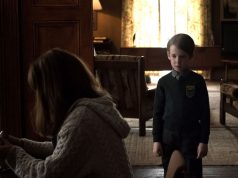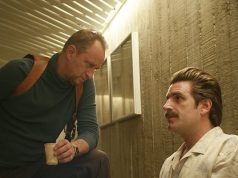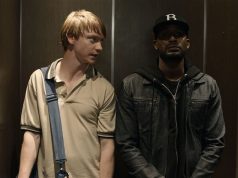“The Trap” is an ominous title for an ominous movie. Using the American film noir as a template, this Serbian production injects quiet contemplation of moral dilemmas into the genre. It’s like a deep and thoughtful version of “Double Indemnity.”
In fact, it might be a little too thoughtful for its own good. The plot is admirably straightforward and uncomplicated, but the movie’s languid pace makes it feel overlong, an 80-minute movie trapped in the body of a 106-minute movie. A tighter pace, with fewer scenes of the main character caught in indecision — that kind of thing is almost never interesting outside of “Hamlet” — would do wonders for it.
Even as it is, though, it’s a compelling, unsettling story, and it’s easy to see why it made the shortlist of potential nominees in the foreign-language Oscar category. It addresses an issue that most people don’t want to face: the fact that some people’s lives are more valuable than others’.
In Belgrade lives a working stiff named Mladen (Nebojsa Glogovac), an ordinary man whose wife Marija (Natasa Ninkovic) teaches English and whose young son Nemanja (Marko Djorovic) is on a swim team. Intercut with these scene-setting details are moments of Mladen, apparently some time later, telling the story to an unseen interviewer. A deposition, perhaps? Mladen looks like he’s been beaten up. Again: ominous. Things are obviously going to go amiss at some point.
The crisis arrives when young Nemanja is found to have a heart condition that requires surgery, a procedure that will cost 26,000 Euros. The family doesn’t have that kind of money, not even close. They run an item in the newspaper asking for donations, but none come.
Then a stranger contacts Mladen with a very simple proposition: He will give Mladen 30,000 Euros if Mladen will do him the favor of killing someone. The proposed victim is a thorn in the side of the stranger and his implied associates. Who the victim is turns out to be a sickening surprise for Mladen, making his unbearable dilemma even harder.
Directed by Srdjan Golubovic and based on a novel by Nenad Teofilovic, this is a film that genuinely provokes thought. Your first instinct is that of course killing this man is wrong. But consider the alternative: If he doesn’t do it, his son will die. What parent wouldn’t trade the life of a stranger — a bad guy, apparently — for the life of his own child?
“The Trap” takes the story further than that, in ways I won’t mention except to say that Mladen’s situation becomes even more desperate and bleak. Eventually he comes to resemble not just a film-noir anti-hero but the protagonist of a Greek tragedy, too. How can someone with such good intentions end up so screwed?
The film finds bitter irony in the uneven distribution of wealth, where obscenely wealthy people live alongside — and do nothing to help — lower-income families. It is noted that an acquaintance of Marija’s paid 30,000 Euros for a picture frame — not even for the painting in it, but for the frame alone. That frame is worth the same amount of money as Marija’s son.
Nebojsa Glogovac’s central performance is good, though I’m frustrated that he doesn’t become emotional until the end. For most of the film, his impassive face is a barrier between the audience and his existential crises. Considering how much focus there is on his inner turmoil, it would be nice if he gave us any way of accessing it. You don’t have to wear your heart on your sleeve, but come on. Throw us a bone here.
Despite some misgivings, I can still recommend the film as a haunting melodrama. It may have some extra padding, but its bone structure — the basic story and the way it’s laid out — is impeccable.
B- (1 hr., 46 min.; Serbo-Croatian with subtitles; )





